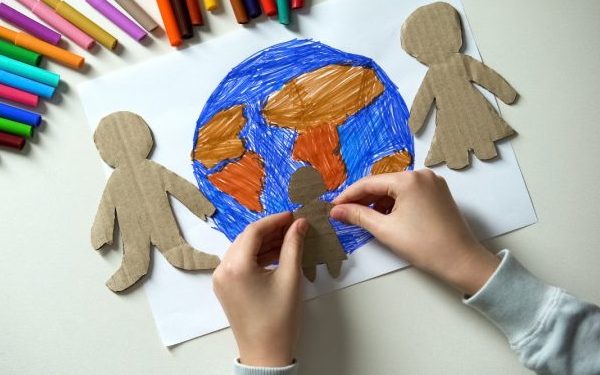
Looked-after children are being denied their right to a family because of councils’ lack of data on potential overseas placements and “stretched” social workers’ difficulties in exploring them, a charity has warned.
Children and Families Across Borders (CFAB) found that UK local authorities explored the possibility of reuniting just 233 children in care with family members in a different country in 2018-20, with an “extremely low”112 being placed. The charity said its “conservative estimate” was that an overseas placement could be an option for 5,500 children in care in England and Wales, 30% of the 18,500 it had calculated as having family members abroad.
Ninety four per cent of the 211 authorities with social services responsibility responded to a freedom of information request from CFAB, with most (52%)not being able to say for how many looked-after children they had explored overseas placements.
The charity said the lack of data and the very low placement rate suggested some children in care were being denied their right to a family – contrary to the ethos of the Children Act 1989 and UN Convention on the Rights of the Child.
Social workers ‘stretched beyond imagination’
Social workers often did not explore overseas placements because the process was “complicated and drawn out”, and there was “confusion about how to navigate multiple child protection systems and communicate with agencies overseas”, CFAB said.
Carolyn Housman, chief executive of CFAB, told Community Care the biggest reason why children’s services did not explore more overseas placements was because they were “stretched beyond imagination”.
“That doesn’t mean there isn’t good will, good intent, and social workers acting in the best interests of children,” she said.
“But when they’ve got too high caseloads and there’s not enough funding to understand how to navigate these complicated systems, things drop to the bottom of the priority list, unfortunately.”
She said social workers not being trained on how to make overseas placements was “a problem”, but a greater issue was practitioners being unaware of where they could get support.
Housman said it was “incredibly hard” for social workers to be trained on “200 different social service systems around the world in different countries and different languages” but there were authorities set up to assist them.
She said the Hague Convention on Parental Responsibility and Protection of Children 1996, to which 53 countries, including the UK, were signatories, provided a central authority to help social workers get record checks, assessments or other reports on families and placements overseas.
Related articles
More placements being explored
CFAB welcomed an increase in the number of overseas placements explored in 2018-20 (233) compared with 2015-17 (202), for which it previously collected data, though the proportion of authorities doing so dropped from 49% to 39%.
Fewer looked-after children were placed with family members abroad in 2018-20 (112) than the previous three-year period (121), CFAB estimated, though it said a decrease in 2020 was expected due to Covid-related border closures.
In fact, CFAB said the relatively narrow decline could indicate that “as the impacts of Covid-19 continue to lessen, the numbers of looked-after children being placed abroad may continue to rise”.
It said this was “an encouraging finding which suggests that international kinship placements are being considered more regularly as a viable option for looked-after children”.
Housman added: “I do think the picture will improve. I think it has to, given the nature of the country and the world that we live in. But I think there are some blockages that aren’t being addressed by governments and there’s a cost.”
Directors: overseas assessments ‘time consuming’
The Association of Directors of Children’s Services (ADCS) said obtaining assessments for family members overseas that met British legal requirements could be “difficult and time consuming”.
“However, this should not prevent local authorities from exploring prospective carers as an option when this is in the best interests of the child,” said Sara Tough, chair of the ADCS families, communities and young people policy committee.
Tough said it was important to involve children in decisions about their lives, as some “may not want to move away from the places and people they know and love”.
She said the increase in children in care having family abroad explored as potential carers was a positive, as it showed local authorities continued to consider international placements “even in the context of a global health crisis”.
Process for placing looked-after children abroad
CFAB’s international kinship care guide, published in November 2020, details the steps social workers should take when exploring overseas placements for looked-after children including:
- Pre proceedings – local authorities should assess whether family members overseas are interested in being alternative carers for the child and whether they have the basic conditions and ability to do so. They should ensure the potential kinship carer has legal support both in the country where the child is and where the placement would be.
- During proceedings – councils should arrange a full assessment of the suitability of the overseas placement with the cooperation of overseas authorities. A UK social worker and an overseas social worker may both complete part of the assessment.
- Placement/permanency planning – authorities should inform carers of their right to support (sometimes financial) and whether the UK or overseas authority is responsible for this. Contingency planning should be made for the case of a placement breakdown within a specified amount of time. Local authorities should request post-placement visits to identify any additional support needed. Social workers should help prepare the child and family for the placement. They must seek specialist legal advice to ensure that, if the child is placed abroad, the guardianship of the child will be legally recognised.
- Post proceedings – social workers should consider practical arrangements such as flights and transport to the placement. The child might need someone to accompany them during the journey and an interpreter when they arrive at the placement.




 Bournemouth, Christchurch and Poole
Bournemouth, Christchurch and Poole  Hampshire County Council
Hampshire County Council  Lincolnshire County Council
Lincolnshire County Council  Norfolk County Council
Norfolk County Council  Northamptonshire Children’s Trust
Northamptonshire Children’s Trust  South Gloucestershire Council
South Gloucestershire Council  Wiltshire Council
Wiltshire Council  Wokingham Borough Council
Wokingham Borough Council  Children and young people with SEND are ‘valued and prioritised’ in Wiltshire, find inspectors
Children and young people with SEND are ‘valued and prioritised’ in Wiltshire, find inspectors  How specialist refugee teams benefit young people and social workers
How specialist refugee teams benefit young people and social workers  Podcast: returning to social work after becoming a first-time parent
Podcast: returning to social work after becoming a first-time parent  Podcast: would you work for an inadequate-rated service?
Podcast: would you work for an inadequate-rated service?  Family help: one local authority’s experience of the model
Family help: one local authority’s experience of the model  Workforce Insights – showcasing a selection of the sector’s top recruiters
Workforce Insights – showcasing a selection of the sector’s top recruiters 

 Facebook
Facebook X
X LinkedIn
LinkedIn Instagram
Instagram
I have worked with SSAFFA/ adoptive placements of children in care. And I have taken trips to see child in placement, regular reviews. I found this to be a great experience. What helped that I am a native speaker of German.
I think planning is key and also clarity about roles.
Start by asking children what they want perhaps?
Forces families have always had to make choices about kinship or other care options by dint of where they are deployed internationally. Officers get allowances for public school fees and some like me grow up on and are educated on military bases. SSAFA has a long history of supporting forces families in very specific environments so for me excellent though their knowledge and expertise and networks are I don’t think that can be a benchmark. When I returned to Scotland I struggled enormously and was subjected to taunts and indeed racism white though I am. I think adults need to understand that what they think is preferable and culturally positive may not become the experience of children. If anyone asked me at age 14 if I wanted to leave Cyprus and the Greek and Turkish Cypriot friends and return to my ‘country’ I would have said I did not. Ask the children, they value familiarity more than adults with their own priorities might want to acknowledge.
Your experiences are obviously personal to you and your feelings are too but if you are white you cannot experience racism. Those of us suffering from post traumatic slavery disorder know that only too well.
As you say Clem my own lived experience is mine and can’t be reinterpreted or diminished by you or anyone else. I was referred to and taunted as a Donna though it bears no resemblance to my name simply on account of coming to Scotland from the Eastern Mediterranean. Do explain to me why by dint of my auburn hair that doesn’t make the assumptions behind it racist.